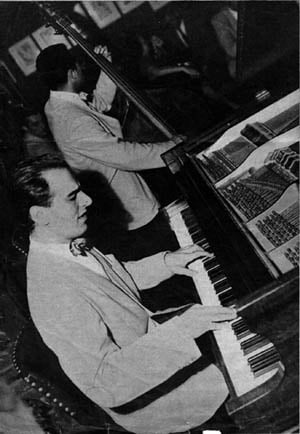| Author |
 Topic Search Topic Search  Topic Options Topic Options
|
Vibrationbaby 
Forum Senior Member

Joined: February 13 2004
Status: Offline
Points: 6898
|
 Posted: August 09 2013 at 12:24 Posted: August 09 2013 at 12:24 |
Well even when they were doing classical ripoffs they were reworking them. Do you think Pictures At An Exhibition was the way Modest Mussgorgsky wrote it. And they never played it the same way. Do you think Emerson had the sheet music in front of him with a page turner.
Edited by Vibrationbaby - August 09 2013 at 12:29
|
 |
Guldbamsen 
Special Collaborator


Retired Admin
Joined: January 22 2009
Location: Magic Theatre
Status: Offline
Points: 23098
|
 Posted: August 09 2013 at 12:26 Posted: August 09 2013 at 12:26 |
|
The Japanese are also pretty neat at this. Taj Mahal Travellers practically made "Japrock", and it's all free-form. All of their releases are live concerts from different venues. Think TD's Zeit meets fusionesque version of Faust.
|
|
“The Guide says there is an art to flying or rather a knack. The knack lies in learning how to throw yourself at the ground and miss.”
- Douglas Adams
|
 |
The.Crimson.King 
Forum Senior Member


Joined: March 29 2013
Location: WA
Status: Offline
Points: 4591
|
 Posted: August 09 2013 at 13:35 Posted: August 09 2013 at 13:35 |
 Vibrationbaby wrote: Vibrationbaby wrote:
Well even when they were doing classical ripoffs they were reworking them. Do you think Pictures At An Exhibition was the way Modest Mussgorgsky wrote it. And they never played it the same way. Do you think Emerson had the sheet music in front of him with a page turner.
|
Although there's obviously tons of room for Emo to improv in Pictures - which he utilizes to the fullest, both Promenade's and Great Gates of Kiev are highly structured pieces which I'm sure was simple memorization for him.
I would love to see the sheet music though for his Moog Ribbon Controller Solo 
|
|
|
 |
Rando 
Forum Senior Member


Joined: April 08 2006
Location: Bay Area
Status: Offline
Points: 472
|
 Posted: August 09 2013 at 15:28 Posted: August 09 2013 at 15:28 |
 The Pessimist wrote: The Pessimist wrote:
I would argue though that with King Crimson the improvisation was the focal point, especially in songs like Starless, Indiscipline (Bruford's opening solo) and Level Five off the top of my head.
|
This thread (and this post) made me think why Bruford left Yes, I think Bruford was searching for a more open-ended, loose, musical landscape that would allow him to play and utilize improvisation; or something on a more spontaneous level. I always felt Bruford was at heart, (at best) a Jazz drummer more than a Rock drummer. I could hear it in his style and approach when he was in Yes. He was just a little too intricate, choppy, and with too much space in his breaks which is perfect for Jazz. Now this is not to take anything away from him, absolutely not, he's one of the greatest drummers, I just think he finally found the perfect home to settle in with King Crimson. I love Starless. But you might be hard pressed to find much improvisation in Prog. There might be some exceptions here and there. Prog music is built more on structure, with set arrangements. that do not change. Nice thread. 
|
|
- Music is Life, that's why our hearts have beats -
|
 |
m2thek 
Prog Reviewer

Joined: November 12 2009
Location: NY
Status: Offline
Points: 220
|
 Posted: August 09 2013 at 16:06 Posted: August 09 2013 at 16:06 |
In regards to King Crimson's 70s era, I think most people would place their composed songs over their improvised songs. Yes, some great songs had both (like Starless), but there's a very clear divide between the two kinds of pieces.
In general, I think it's fine during a live performance: you're physically present so you feel the energy of it, you only hear it once, the musicians feed off of each other, new twists on familiar songs, etc. However, as soon as you put that to a recording is where it breaks down: it goes on for too long, it's usually pretty directionless, doesn't bode well for repeated listenings, etc.
Since I listen to most recorded prog I'll say that I greatly prefer composed pieces of music, but I welcome a little bit of improv at concerts (ex, extending the solo of Comfortably Numb during a PF tribute show)
|
 |
Man With Hat 
Collaborator


Jazz-Rock/Fusion/Canterbury Team
Joined: March 12 2005
Location: Neurotica
Status: Offline
Points: 166178
|
 Posted: August 09 2013 at 16:34 Posted: August 09 2013 at 16:34 |
|
I like both rigidly scripted and purely improvised music. I agree with those that prog is better suited to the former. But never a problem with throwing in a little free-formity for flavor. (Assuming the musicians can do that sort of thing.)
|
|
Dig me...But don't...Bury me
I'm running still, I shall until, one day, I hope that I'll arrive
Warning: Listening to jazz excessively can cause a laxative effect.
|
 |
The Pessimist 
Prog Reviewer


Joined: June 13 2007
Location: United Kingdom
Status: Offline
Points: 3834
|
 Posted: August 09 2013 at 18:34 Posted: August 09 2013 at 18:34 |
Thanks for the responses guys! So good to see others care about this topic as much as I... First point I'd like to address is the definition of improvisation. For me, it can't be anything other than "momentary composition". Therefore, a good improv is structured in a compositional manner, and has the same boundaries as a composition i.e. Thematic intricacy and recursion The second point is that due to the first point improv can encompass any kind of variant within a framework. There are plenty of mentions of Indian classical music and jazz, and as a jazz student myself I can say safely that the ONLY way to improvise is via a framework. Even when improvising "freely" (I despise this term and it's ambiguity) there are still parameters set as the music progresses, no matter how vague. Third point is that anyone with any kind of musical memory can improvise, as all that is required is a recollection of well learned musical knowledge, so in essence most live performance has some degree of improv entailed within. I've noticed that a lot of posters - and thankyou for doing so - have stated preference in a structure that is not deviated from. The question I must ask in response is this: do you prefer it due to your desire for complete familiarity with the piece being performed? This is not an attack at all, merely an enquiry so we can all learn more about listening habits.
|
|
"Market value is irrelevant to intrinsic value."
Arnold Schoenberg
|
 |
Smurph 
Forum Senior Member


Joined: January 11 2012
Location: Columbus&NYC
Status: Offline
Points: 3167
|
 Posted: August 09 2013 at 19:10 Posted: August 09 2013 at 19:10 |
Personally in a live experience, I am not one that prefers long bouts of improvisation unless it is under a specific set of rules. I prefer music with heavy amounts of movement on all ends. So if there is improv, I prefer it to be over a strict set of bars that are able to mutate much more than the norm with the rhythm section. And it's nice if there are 4 lines of sound (no inclusion of drums or lyrics), so that 2 lines are strict, and 2 lines are improv. This gives a solid chance for gorgeous accidental counterpoint, especially when the musicians are familiar with each other.
But in a studio I prefer, shorter, tight, compact compositions with as much movement as possible. Improv is more for a live setting. Because you only create the album experience one time, to be heard over and over. I want every single note to be as deliberate as possible. You can craft your emotions, and allow your audience to experience your new interpretations of them in a live setting.
But all these thoughts go completely out the window when hearing jazz. Improv is good in jazz as long as it is just damn amazing. (my experience with jazz is limited) Though I'm not sure how much of the 2 different Thelonius Monk/Coltrane recordings are improv.
|
|
|
 |
sleeper 
Prog Reviewer


Joined: October 09 2005
Location: Entropia
Status: Offline
Points: 16449
|
 Posted: August 09 2013 at 19:15 Posted: August 09 2013 at 19:15 |
|
What I loved about early prog is that a lot of it was improvisation built onto a set structure, and not the long endless jams that could have resulted and that other bands freely employed. Sadly improvisation seems to have been phased out of prog since the late 80's/ early 90'swith only a few exceptions.
One of the best live experiences I had was seeing Kayo Dot a few years ago and watching Toby orchestrate the band's music. Easily the best version of __0n Limpid Form I've ever heard, easily blowing the studio version into the weeds. You just can't get that from most bands.
|
Spending more than I should on Prog since 2005 
|
 |
rogerthat 
Prog Reviewer

Joined: September 03 2006
Location: .
Status: Offline
Points: 9869
|
 Posted: August 09 2013 at 22:08 Posted: August 09 2013 at 22:08 |
 The Pessimist wrote: The Pessimist wrote:
The second point is that due to the first point improv can encompass any kind of variant within a framework. There are plenty of mentions of Indian classical music and jazz, and as a jazz student myself I can say safely that the ONLY way to improvise is via a framework. Even when improvising "freely" (I despise this term and it's ambiguity) there are still parameters set as the music progresses, no matter how vague.
|
Exactly. It is the same way in Indian classical music as well: you improvise within a raga. You cannot literally play anything. I think some people in this thread have equated all improvisation to free jazz, which is not very accurate. But what improvisation does bring is an element of surprise so it boils down to whether listeners like surprise or not in their music.
|
 |
rogerthat 
Prog Reviewer

Joined: September 03 2006
Location: .
Status: Offline
Points: 9869
|
 Posted: August 09 2013 at 22:15 Posted: August 09 2013 at 22:15 |
 m2thek wrote: m2thek wrote:
In regards to King Crimson's 70s era, I think most people would place their composed songs over their improvised songs. Yes, some great songs had both (like Starless), but there's a very clear divide between the two kinds of pieces.
|
To be precise, most people would prefer ITCOTCK to their other albums. On the other hand, Poseidon doesn't fare so well. Not only LTIA but even Starless and bible black enjoy higher ratings on this website than Poseidon and Red is pretty close to ITCOTCK. That is probably the flipside of working within a more structured approach. The band is then much more liable to be criticised for repeating itself and Fripp probably wanted to break out of it. Not the criticism part of it, but the restrictive aspects of structure. Sure, the Wetton line up had their excesses but when it works well, like on One More Red Nightmare, the results can be more organic than music that is deliberately fit to a structure.
|
 |
The.Crimson.King 
Forum Senior Member


Joined: March 29 2013
Location: WA
Status: Offline
Points: 4591
|
 Posted: August 09 2013 at 23:13 Posted: August 09 2013 at 23:13 |
One style that hasn't been brought up in this thread is RIO. I'm not as well versed in this as other PA members, and so you know where I'm coming from my modest RIO collection is made up of Henry Cow's "In Praise of Learning", Univers Zero's "UZED", "1313", "Heresie" and the Thinking Plague albums "In This Life" and "In Extremis". Are these albums mostly improvisation or are they highly structured compositions? In many cases the songs seem like a few sections are highly structured but are linked with completely chaotic improvised bridges. A specific example I'm thinking of is the beginning of "In Praise of Learning". "War" opens with Dagmar's vocal mini-song section then runs through some wonderfully chaotic sections to return to the vocal closing.
I know that the chaos in Captain Beefheart's "Trout Mask Replica" was actually composed and rehearsed to the point of a crazy obsession with every single note, but can a RIO expert comment, is this style improvised or highly structured?
Edited by The.Crimson.King - August 09 2013 at 23:14
|
|
|
 |
smartpatrol 
Forum Senior Member


Joined: April 15 2012
Location: My Bedroom
Status: Offline
Points: 14169
|
 Posted: August 09 2013 at 23:20 Posted: August 09 2013 at 23:20 |
|
I enjoy each as much as the other, in general. It all depends on the quality and content of it.
|
 |
zravkapt 
Special Collaborator


Honorary Collaborator
Joined: October 12 2010
Location: Canada
Status: Offline
Points: 6446
|
 Posted: August 09 2013 at 23:38 Posted: August 09 2013 at 23:38 |
 The.Crimson.King wrote: The.Crimson.King wrote:
One style that hasn't been brought up in this thread is RIO. I'm not as well versed in this as other PA members, and so you know where I'm coming from my modest RIO collection is made up of Henry Cow's "In Praise of Learning", Univers Zero's "UZED", "1313", "Heresie" and the Thinking Plague albums "In This Life" and "In Extremis". Are these albums mostly improvisation or are they highly structured compositions? In many cases the songs seem like a few sections are highly structured but are linked with completely chaotic improvised bridges. A specific example I'm thinking of is the beginning of "In Praise of Learning". "War" opens with Dagmar's vocal mini-song section then runs through some wonderfully chaotic sections to return to the vocal closing.
I know that the chaos in Captain Beefheart's "Trout Mask Replica" was actually composed and rehearsed to the point of a crazy obsession with every single note, but can a RIO expert comment, is this style improvised or highly structured?
|
RIO (and avant-prog in general) can be either. Beefheart is highly structured (even if it doesn't sound like it). Univers Zero is highly structured. Henry Cow could be highly structured but usually were very improv based.
|
|
Magma America Great Make Again
|
 |
Vibrationbaby 
Forum Senior Member

Joined: February 13 2004
Status: Offline
Points: 6898
|
 Posted: August 10 2013 at 08:26 Posted: August 10 2013 at 08:26 |
|
I think the best thing that happened to Bruford was his association with Alan Holdsworth who never liked playing the same song twice.
|
 |
npjnpj 
Forum Senior Member

Joined: December 05 2007
Location: Germany
Status: Offline
Points: 2720
|
 Posted: August 10 2013 at 10:50 Posted: August 10 2013 at 10:50 |
|
Several thoughts on this:
- It depends to which genre or sub-genre of prog you're referring, some can take improvising better than others.
- It depends on who's doing the improvising. There are masters and then again there are the incessant noodlers.
- It depends on whether there is any musically structured backing from a rhythm section underlying the improvisation.
- It depends on whether you're talking about live performance or studio albums.
On a studio album a good solo should mostly be composed, planned, and executed. Only in very rare cases does an improvised solo work without additional work. The same song on stage can benefit greatly from a well executed improvised solo, provided the length doesn't get excessive and it's carried by a solid backing.
I've read King Crimsons Wetton-Bruford phase mentioned here as an example, and it works quite well although a lot of the basic tracks were lifted from live stage improvisations, and are kept relatively short. For instance: the Larks and Starless albums I like very much, but The Great Deceiver is far beyond anything in that way that I can enjoy over longer periods of time.
Personally I don't mind longer improvisation on stage if it's interesting and doesn't overpower the musical proceedings uncomfortably (very subjective, I know). I don't think improvising has a place on the studio albums of the genres that I prefer, which are: symphonic prog, heavy prog, prog metal, and a lot of melodic prog-related. As I'm generally very melody oriented and also enjoy complicated but precisely executed musical structures, improvisation can easily damage a lot of my musical enjoyment and require large amounts of Budweiser to endure.
Improvisations in other genres are not anything I have a particularly strong opinion about.
Edited by npjnpj - August 10 2013 at 11:00
|
 |
infocat 
Forum Senior Member


VIP Member
Joined: June 10 2011
Location: Colorado, USA
Status: Offline
Points: 4671
|
 Posted: August 10 2013 at 13:35 Posted: August 10 2013 at 13:35 |
|
I'm always amazed and delighted with Djam Karet's Still No Commercial Potential, which is apparently all improvisation; though you mostly can't tell!
|
|
--
Frank Swarbrick
Belief is not Truth.
|
 |
The Pessimist 
Prog Reviewer


Joined: June 13 2007
Location: United Kingdom
Status: Offline
Points: 3834
|
 Posted: August 10 2013 at 14:35 Posted: August 10 2013 at 14:35 |
 infocat wrote: infocat wrote:
I'm always amazed and delighted with Djam Karet's Still No Commercial Potential, which is apparently all improvisation; though you mostly can't tell! |
There is a saying in the jazz world: if people can tell you're improvising then you're not doing it right  of course it's to be taken with a pinch of salt...
|
|
"Market value is irrelevant to intrinsic value."
Arnold Schoenberg
|
 |
moshkito 
Forum Senior Member


Joined: January 04 2007
Location: Grok City
Status: Offline
Points: 16164
|
 Posted: August 10 2013 at 15:06 Posted: August 10 2013 at 15:06 |
Hi,
It depends on the context and what is happening. Some call it this, that and everything else, but there are many schools of thought that deal with "improvisation", and HOW it is done, is an issue. In general, if you have any "format", or "idea", for what you want in a piece of music, notice I did not say "song", then the improvisational window gets smaller and smaller and the ability to let it fly and die on its own wings, is gone ... it already died in the "format" ... which has a tendency to cut down the abilities.
But there are things that you want to listen to, if you have the musical ability to learn from them, which is where most people fail ... it's missing a beat, it's missing a lyric, it's always missing something!
Examples:
Amon Duul 2, kinda learned their craft in the early days from their "drum circles" that were so big in the late 60's ... and AD2's style, I believe was about taking that free form and just guide it a little bit, and see where it takes you. "Yeti" is their best on this.
Keith Jarrett, specially in his early days, was magnificent at improvisation. Considered a jzzz person, USUALLY means that you are playing around chords and notes, although when you hear "The Koln Convert" you might find that a piece or two appear to sound a bit mechanical and clever, but others are just outright ... free.
Egberto Gismonti, in his early days of guitar playing was more about the sound of the thing and the moods they created. He can also do this with a piano.
Guru Guru, was the ultimate improvisation work in the early days, unffortunately most of it ended with "Dance of the Flames", which still has the guitar going everywhere until it's done with the part it is doing. There is a reason why their early stuff had titles like ... "LSD March" and some other things, but in the middle you get something that is similar to what you probably would want to hear Jimi Hendrix do if he had survived.
CAN, had its improvisational methods kinda worked out from their Berlin music schools, and it was mostly centered around ... no western concepts ... though later, this changed some, specially after Damo left. He himself came from the same theater/film style of improvisation that was so active in the work in Germany, and CAN is almost a follow up to that.
American music, for my tastes, does not have enough improvisation. Mostly they are centered on a theme or a chord, and solos, which not all improvisations are about. It's kinda like Miles Davis, who used to say ... I do my part first, then I pass it to you, then you pass it to him, then we come together, and in between all's fair and love and hate ... and there were some excellent things, albeit some of them are difficult to connect and explain musically, but that is Miles ... a rebel.
The "Fillmore", or "Greateful Dead" kind of experimentation, was not always about the chord or the song, or anything else, as their early bootlegs showed, something that has never made it to CD or album, and it was one of the things that helped a lot of people learn how to do long cuts, and explore the musical side of things. However, because many of these were never recorded, or appreciated by anybody, none of them have been studied for a bigger and better value, than one riff for a song! Personally I find that sad, but in the end, the musicians involved were not as refined in music history, other than just learn anything as you go.
Europe, having a much longer musical tradition, tends to be more centered on musical designs, although, as mentioned, there are music schools that are different on purpose.
Lastly ... the eastern model for "improvisation" is very different, and folks like Ravi Shankar were massive in helping us hear it ... but it's a cold day in heck that many folks that like "progressive, or prog, will ever listen to a huge raga that can go as much as an hour ... and "get something" out of it, without asking ... where's the song? Listening to "raga's" is an exercise in improvisation, and the only goal is to get to a point, where the music and the person are one, and meaningful. This is hard in "western music" because the center of the music is outside of the person, and it always has to be "composed", where the "raga" concept, is not meant to be composed, although both you and I would think that if I were to do it I might want to start with this or that ... and go from there. There is no rock band that is anywhere near doing this, even in India!
The King Crimson, and in general, English style of experimenting is called "guided improvisation" in theater. I, personally, do not think that it is as valid an improvisation, as it is a very detailed and specific way to go about rehearsing and learning to get better! This is NOT something that most musicians ever get involved in!
There is another thread where I have discussed the Robert Fripp/KC style of improvisation. Honestly, compared to others, this is a "result" of an improvisation, and not an improvisation AT ALL in the final product.
But whatever you do, do not comfuse a 30 second chord change as an improvisation ... it kinda counts, but it is not leading the song in new directions. Usually, the point of ANY improvisation, is to find new places for the music to come alive and live. The only issue is, not enough people have an ear for this kind of stuff, and even most (supposedly) improvisational stuff you find here listed in prog/progressive, is not anywhere near the word and its meaning!
Edited by moshkito - August 13 2013 at 10:34
|
|
Music is not just for listening ... it is for LIVING ... you got to feel it to know what's it about! Not being told!
www.pedrosena.com
|
 |
moshkito 
Forum Senior Member


Joined: January 04 2007
Location: Grok City
Status: Offline
Points: 16164
|
 Posted: August 10 2013 at 15:25 Posted: August 10 2013 at 15:25 |
 npjnpj wrote: npjnpj wrote:
Several thoughts on this:
- It depends to which genre or sub-genre of prog you're referring, some can take improvising better than others.
- It depends on who's doing the improvising. There are masters and then again there are the incessant noodlers.
- It depends on whether there is any musically structured backing from a rhythm section underlying the improvisation.
- It depends on whether you're talking about live performance or studio albums.
...
|
I'm not sure about this.
I've seen a lot of improvisation in so much different music, and it could be the Brazilian Indians, or the American Indians in a pow-wow, or anything else. We make it sound like this HAS TO BE MUSIC, AND MUST FOLLOW THE MUSIC PRETEXTS AND IDEAS ... and that is the anti-thesis, of what the word "improvisation" means.
Master and Noodlers ... I can accept ... but we should state that the "master" category for improvisation is under 1%!
The structured backing comment is strange ... it's already limited to the "structure" of "rhythm" ... and no longer an improvisation. It's time span is limited to the pop/rock/jazz ideas! That is a "song" format and not inclined to help create improvised material.
Live or memorex. Goes both ways. You can not say that Keith Jarrett is better live than he is on Memorex. Or that Ax Gernreich with Guru Guru was any better live or memorex ... he was crazy in both states ... it didn't matter, and you can check his solo albums for a bunch of fun weirdness! You don't think that's improvised? Another example is Miles Davis ... you almost never want to get his studio albums ... because he is better live, even though things change and are so different. Why? He knew the secret of music and what improvised material did for it all that one's mind could not make it better.
You want to learn improvisation? ... give your 3 year old child a small keyboard, and your homework is to play together with the kid for 10 minutes. If you get frustrated and tell the kid anything ... you LOSE!
Edited by moshkito - August 10 2013 at 15:27
|
|
Music is not just for listening ... it is for LIVING ... you got to feel it to know what's it about! Not being told!
www.pedrosena.com
|
 |
/PAlogo_v2.gif)


